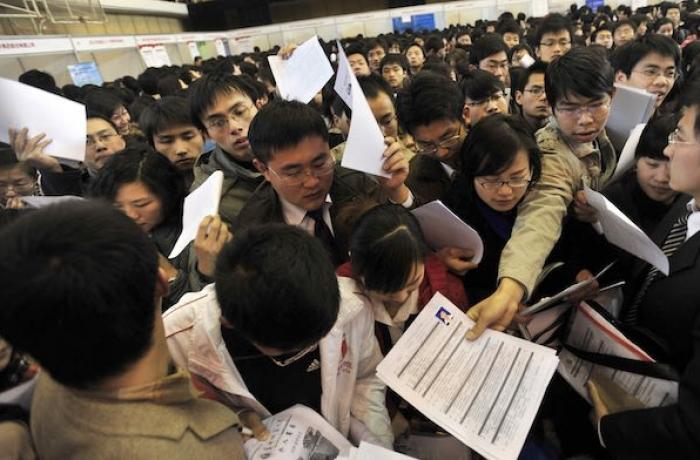China’s unemployment rate for young people is hitting record highs. A record 10 million university students will also graduate in 2022 and flood the labor market. It will be very difficult for these students to find a job. What’s the cause? NTD spoke with Ethan Yang, a China expert and economic analyst, to learn more.
According to a report, China’s economy is struggling to produce enough jobs for its educated workforce, a problem that could persist even after Covid-19 curbs are finally lifted
Shanghai is reopening, to the relief of millions of residents. The hashtag “Shanghai is back” is lighting up Weibo, China’s Twitter -like microblogging service.
But the scenes of jubilation from Shanghai, and modestly better economic news—factory purchasing managers index readings for May have ticked up—belie a deeply troubled labor market. Unemployment for the 16-to-24-year-old cohort was 18.2% in April according to China’s statistics bureau, well above the previous recorded high of 16.8% in July and August of 2020. Given that youth unemployment typically peaks in the several months after graduation, that number will probably head even higher this summer. Less than half of new college graduates had an offer in hand as of last month according to a survey from online recruitment website Zhaopin, compared with 63% in the spring of 2021, and about 75% in 2018.
Such numbers track with official data showing a steady march higher in youth unemployment over the past four years—and therein lies the real worry for China.
The pandemic and Beijing’s harsh “zero-Covid” policies have undoubtedly been devastating for China’s service sector, which absorbs most college graduates. But more-structural factors also are pushing up youth unemployment. Most obviously, the number of new Chinese postsecondary graduates continues to rise every year, hitting a record 10.8 million in 2022. That number could reach nearly 12 million by 2024, HSBC analysts estimated last year.
READ ALSO: US: Gunman kills at least three in Tulsa, Oklahoma
If all those new graduates were intent on chasing opportunities in high-paying, high-productivity sectors such as information technology—and those job openings were increasing at a reasonable clip—then a burgeoning cohort of well-educated young people would be an unalloyed positive for China. But in fact the opposite seems to be happening: Chinese graduates are getting more risk-averse and more inclined to seek work in the state sector. In 2019, Zhaopin found that about 40% of graduates preferred jobs working for the government or state-owned companies, while 21% preferred the private sector. By 2022, those preferring private-sector work had fallen to just 17% of graduating class, while a full 54% preferred the state sector.
To be sure, some of this pessimism reflects the overall sluggishness in services and private-sector hiring related to China’s Covid-19 control policies. But last year’s ruthless crackdown on China’s consumer tech and education sectors is clearly a factor, too. Top tech firms including Alibaba, Tencent and Didi are all planning thousands of layoffs this year—with Tencent alone poised to cut about 20% of its 20,000-person-strong cloud and smart industry business. Tech and education, along with finance, also happened to be the top choices for graduates of top Chinese university Tsinghua as recently as 2020, according to HSBC.
With rising competition for a shrinking pool of top jobs, it is little wonder that China’s young workers are in a sour mood. Internet catchphrases like “lying flat,” and some even darker ones that have gained currency in the wake of the Shanghai lockdown reflect real difficulties, and not just youthful cynicism. As was the case with American graduates who struggled after the financial crisis to advance in their careers, buy houses and start families, the economic effects—and potentially, political ones as well—could be long-lasting.













